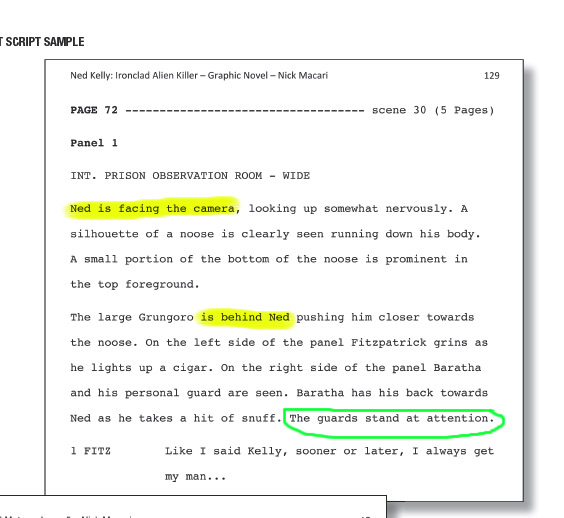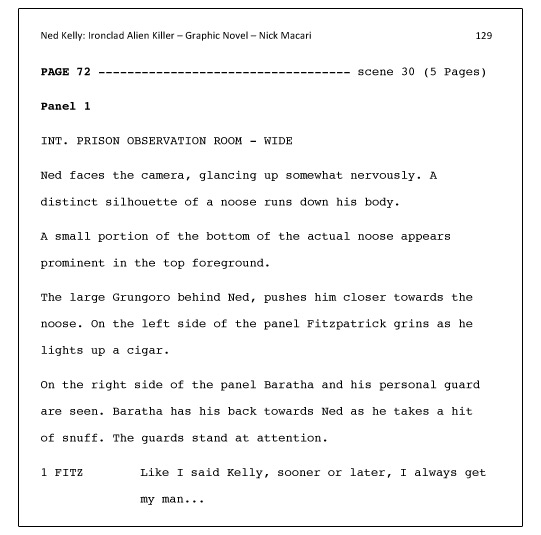One of the top three problems I see from new writers is passive writing. Because fixing it dramatically improves a work, it’s also one of the first things I tend to address when working with said writers.
For some reason I see a lot of passive writing in comics.
Not sure why it gets a pass by many editors… but if you want to sharpen your script to a carbon razor edge, drop it.
So what exactly is Passive Writing?
Technically (and primarily) it’s when the subject of the sentence receives the action instead of performing it.
In layman’s terms, it’s when you make your sentence too wordy, usually using some form of the verb “be” (as in “to be”) as a crutch putting emphasis on the action itself instead of the subject performing it.
Let me give you a couple examples from my own work, the Excalibur story I’ve been working on. Yes, passive lines slip into my work unintentionally from time to time. But I always make a point to search through my scripts and weed them out at the end (or rely on a good editor to catch them).
“But the amazon was now acting from a primal place and would not be easily subdued again.”
Sometimes passive elements walk the technical line. The passive element here is “was now acting”. To take this into active voice, we assign the action directly to the subject–in this case the amazon, like so:
“But the amazon acted from a primal place and would not be easily subdued again.”
(You in the back, shut up about the “But” lead off.)
Here’s another one.
“They could see a large black form beneath them, with what looked like four distinct necks ending in angular shaped heads.”
Here I’m saying the subject “could” see–not specifying that the subject “did” see. I’m speaking passively. With a simple change:
“They saw a large black form beneath them, with what looked like four distinct necks ending in angular shaped heads.”
Of course there are times and places where passive sentences come in handy. When the subject is unknown (or unimportant) for example, or ambiguity is intended (among a few others), but generally speaking passive sentences should appear few and far between.
In this same vein, another important thing to look out for is relying on weak verbs–in particular “to be” verbs. While weak verbs can translate the meaning you’re looking to express, scripts relying on weak verbs will almost always come across wordy and inefficient.
It’s particularly easy to rely on “to be” verbs when you’re writing a tight script. There tends to be a natural inclination to use them when your relaying a specific set of instructions.
Let’s take a look at what I’m talking about.
Notice above, I highlighted two spots where I relied on “is”.
Often a “to be” verb will be followed by a present participle verb–a word ending in “ing” (not always, but often the case). If you find a lot of “ing-ending verbs” in your script, stop and review, you can probably tighten things up a bit.
I also circled a spot where a direct verb was used. Notice how much shorter and precise the sentence is.
Now here’s another version of the same panel with the “to be” verbs edited out. You’ll probably agree, the new version is cleaner, more efficient and just reads better.
Hardly a perfectly written, stellar panel, but I think you get the point.
You may notice in the revised version I switched up a couple of words. I talk more about diction and verb selection in the writing visually section of the “Working Writer’s Guide to Comics and Graphic Novels”, so I’m not going to delve into that here.
Writing in the active voice creates more efficient, easier to understand and usually sharper sentences. Avoiding the “to be” verbs makes for a more focused, efficient script.
Particularly important aspects when writing in the limited confines of a comic book narrative.▪
About the Author —
Nick Macari is a full-time freelance story consultant, developmental editor and writer, working primarily in the independent gaming and comic markets. His first published comic appeared on shelves via Diamond in the late 90’s. Today you can find his comic work on comixology, amazon and in select stores around the U.S. Visit NickMacari.com for social media contacts and news on his latest releases.
For more tips, bookmark the writing craft page. For all the tips buy the book.
Show your support by sharing the writing craft page on your social media.
© 2016 Nick Macari. No reproduction without written permission.



One thought on “Pass the Passive Writing”
Comments are closed.